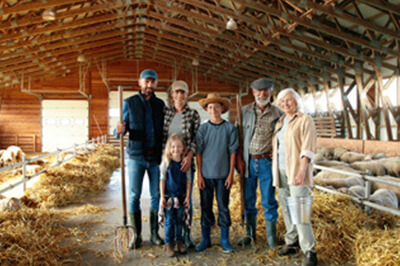Farm Estate Planning Strategies
Farm owners put seemingly endless time, work and expertise into their land and business. Despite all their dedication, research from the U.S. Department of Agriculture’s National Agricultural Statistics Service shows 97% of the 2.1 million farms in the United States are family owned. But only 30% of those farms succeed to the next generation, and only 12% pass down to a third generation as a farm inheritance. The research also shows most farmers (69%) expected to pass down their farm to their heirs, but only 23% had made a farm estate planning strategy.

If you want to pass along your legacy to future generations, it’s never too early to begin planning the best way to transfer your family farm. Meet with experts, know your options, and put the pieces in place so their farm inheritance is secure.
How to Clarify Your Farm Estate Planning Strategy
As you’re looking for the best way to transfer your family farm, there are some questions only you can answer. But once you know what you want for the future of your property and business, a farm estate planner can help you achieve your goals.
Consider the Different Value Propositions
Farm property and farming operations are two different economic spheres, so we need to consider them individually, but coordinate them in unison.
Consult an Expert
Schedule a discovery meeting with a farm estate planner. Tell them about your current farm assets and operations, as well as your long-term goals and vision.
Explain Your End Goals
If you plan to sell your farm when you retire, your farm estate planner will advise you on how to maximize the value of your farm and its operations, so you (and your heirs) can make the most money from the sale. Alternatively, if you’re hoping to pass down your farm to future generations, your planner should help you strategically minimize the estimated value of the enterprise to diminish the amount of tax assessed on your inheritor upon transfer.
The Best Way to Transfer a Family Farm
Talk About the Emotions
As the current owner and/or operator of the farm, you’ll have to plan for the day when you have to cede control. Likewise, your inheritor(s) will have to learn the ins and outs of the land, the operations, contractors and vendor relations, so they’ll feel confident taking over farm operations when the time comes.
Talk through how you’ll achieve this transfer of information and control, and communicate feelings openly as you do. It’s OK if the transfer still feels overwhelming when the day comes, but feeling prepared will mitigate a lot of unease.
Consider How Many Inheritors You’ll Have
If you’re planning to pass down your farm to multiple heirs, it may not be logical to divide the land or profits equally among them. One inheritor may be staying on the farm, overseeing operations, or performing the work themselves. It will likely make more sense for this person to earn a greater percentage of the proceeds.
Prepare the Farm to Be Divided
Both an LLC and a trust are legal structures you could use to allocate your farm to your heirs. Through an LLC (limited liability company), you can divide your farm property into classifications such as farmable land, marshland, timber, etc. Then the LLC can disperse percentages of ownership.
A revocable living trust is a way to hold, manage and allocate property. Through this type of trust, you can retain control over the farm and its operations for as long as you choose, with the mechanisms in place for transfer in case of incapacity or disability. You can set up your revocable living trust, so your heir can progressively buy into the business — spreading out payments, so the ultimate transfer of assets will create fewer tax penalties.
How Can Your Bank Help?
First National Bank and Trust is proud to help our farming neighbors with many aspects of your business, including
growing or passing down the farm. At your
local branch, team members can help you apply for operating lines of credit or agricultural real estate loans. And if you’re considering farm estate planning strategies, we can set up a trust to allocate your property and business the way you want. With competitive interest rates, and local decision-making and services, you’ll receive the personalized attention you deserve.
Contact us to learn more details.
Read more about estate planning in
Estate Planning 101.